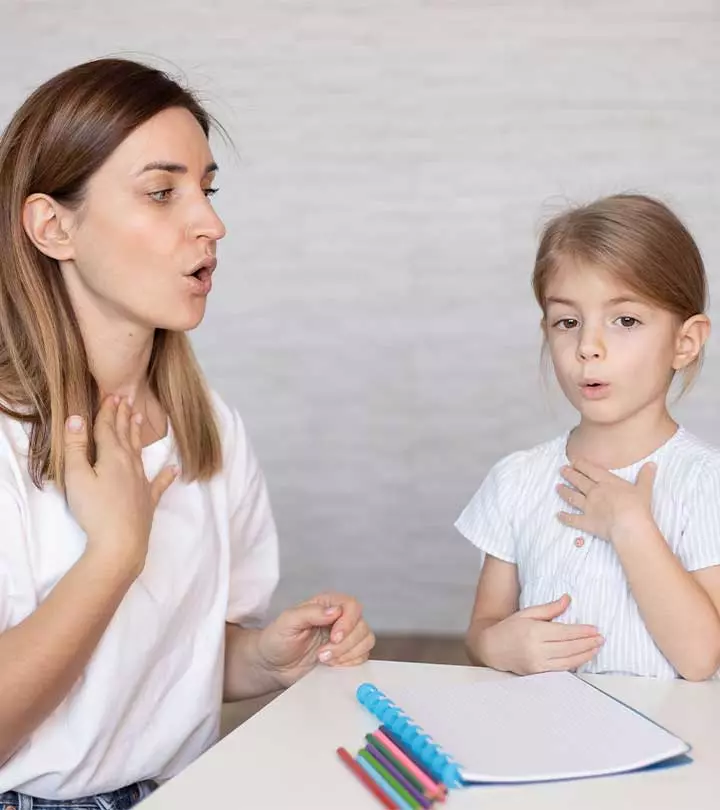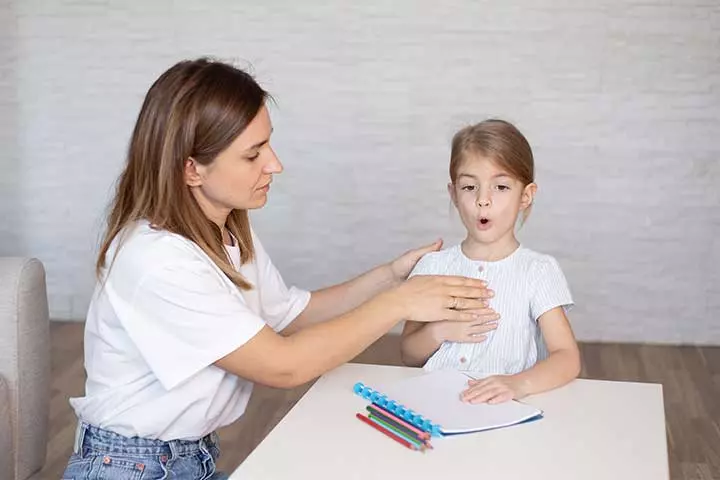
Image: Shutterstock
Parenting is all about wonders and challenges, especially when it comes to your toddler’s milestones. As your child explores the world, you eagerly await their first words. But what if your toddler isn’t talking as expected? Before jumping to conclusions, we need to grasp the nuances of language development, and learn when to seek professional help. In this article, we’ll delve into late talkers, reasons for speech delays, and offer guidance on when to worry and act. Read on!
What Does “Late Talker” Mean?
Image: Shutterstock
The term ‘late talker’ refers to a toddler exhibiting language development at a pace slower than expected when compared to their peers. Typically recognized between 18 to 24 months of age, late talkers are children who haven’t yet started using a substantial number of words or forming basic sentences. It’s important to note that the term “late talker” isn’t intended to provoke concern or worry among parents. Instead, it serves as a descriptive term designed to help parents and caregivers identify when a child’s language skills may be advancing at a unique pace.
Each child’s path of development is distinctive, shaped by an array of elements like genetics, surroundings, temperament, and language exposure. Understanding the broad range of what’s considered normal in language acquisition is crucial. Some children embark on their language journey with exuberant babbling and sound exploration from an early age, while others may adopt a more methodical and deliberate approach. These unique differences are entirely natural and need not necessarily spark worries about a child’s future language skills or cognitive capacities.
Late talking is not an indication of permanent language delay or cognitive impairment. Many children who initially fall into the “late talker” category eventually catch up to their peers and achieve age-appropriate language skills with the right guidance and support. It’s essential for parents to approach this phase with patience, understanding, and a proactive attitude.
Why Your Toddler May Not Be Talking
Image: Shutterstock
Numerous factors can contribute to a toddler’s delayed speech, and it’s often a combination of these factors that lead to their unique pace of development. Here are some common reasons why your toddler might not be talking as much as you expected:
1. Genetics
Just like other aspects of development, language skills can be influenced by genetics. If there’s a family history of late talkers, your child might follow a similar pattern.
2. Personality
Some children are naturally more reserved or observant, preferring to absorb their surroundings before actively engaging in conversation.
3. Hearing Issues
Hearing problems, even minor ones, can significantly impact a toddler’s ability to pick up language cues and develop speech. Ear infections or other hearing-related concerns should be addressed promptly.
4. Language Exposure
The environment a child is exposed to plays a crucial role in language development. If a toddler isn’t exposed to a variety of words and conversations, their vocabulary growth might be slower.
5. Bilingualism
Children growing up in bilingual households might take a little longer to develop language skills as they navigate between multiple languages.
6. Motor Skills
Sometimes, speech delays can be linked to difficulties in coordinating the motor skills necessary for speaking.
Your 18-Month-Old Isn’t Talking: When To Worry
Image: Shutterstock
At around 18 months, most children have begun to say a few words and are starting to form simple sentences. However, every child follows their unique timeline. If your 18-month-old isn’t talking as much as their peers, there’s no need to panic immediately. Keep in mind that some children are late bloomers in the language department. Instead of worrying, focus on encouraging communication through gestures, pointing, and other non-verbal cues. Create a supportive environment by talking to your child, reading aloud, and engaging in interactive activities that stimulate their language development.
Your 2-Year-Old Isn’t Talking: When To Worry
By the time your child reaches the age of 2, you might expect them to have a vocabulary of about 50 words and be able to string two-word phrases together. However, if your 2-year-old is still struggling with basic speech, it’s a good idea to consult a pediatrician or a speech-language pathologist. Early intervention is key in addressing potential speech delays. Professionals can assess your child’s speech and language skills, identify any underlying issues, and provide guidance on how to support their development effectively.
The journey of parenthood is filled with joys, challenges, and moments of uncertainty. If your toddler isn’t talking as much as you anticipated, remember that each child develops at their own pace. While it’s normal to be concerned, it’s equally important not to jump to conclusions or blame yourself. Late talkers are more common than you might think, and many children catch up to their peers with the right support.
Create an environment that encourages communication, be patient, and seek professional advice if you notice persistent delays. Remember that language development is just one aspect of your child’s growth, and their unique qualities and strengths extend far beyond their ability to speak. As you navigate this phase, cherish the journey of discovery and celebrate each milestone, whether big or small. Let us know in the comments if you have ever dealt with a later talker child and your experience with them!















